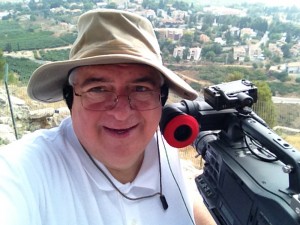 I enjoy working with a student journalist/reporter on projects and have successfully enabled them to have the experience that prepares them for working in this business. When we are on the way to our first story opportunity I am working with them to come up with a game plan. I figure out how much time we have to actually gather the elements we need for each story. In the projects we don’t have the deadline most journalists have of getting the package edited and ready for air in a short time, but we still have the same pressures of efficiently getting the pieces that will be necessary for a great story. If we arrive on the scene and figure we have 1 hour to gather what we need, then both the reporter and I are monitoring the clock and making sure we are on the road when an hour is up and keeping each other updated on the time and on track.
I enjoy working with a student journalist/reporter on projects and have successfully enabled them to have the experience that prepares them for working in this business. When we are on the way to our first story opportunity I am working with them to come up with a game plan. I figure out how much time we have to actually gather the elements we need for each story. In the projects we don’t have the deadline most journalists have of getting the package edited and ready for air in a short time, but we still have the same pressures of efficiently getting the pieces that will be necessary for a great story. If we arrive on the scene and figure we have 1 hour to gather what we need, then both the reporter and I are monitoring the clock and making sure we are on the road when an hour is up and keeping each other updated on the time and on track.
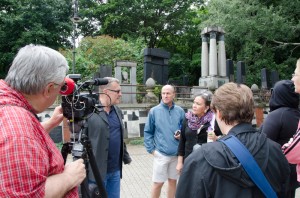 I try and have a “team” plan so we are ready to go as soon as you get out of the transportation, whether by car or on a tour bus. When I know things are going to be tight I make sure that the reporter and I are on the same page on what needs to be done to utilize our time the best. I hand my wireless lav or handheld to my reporter. That way I can go get the visuals, the natural sounds and back up visuals. While my student is looking for soundbites. There is no need to follow each other around. It is usually best to split up and utilize your time. I have my headphones on and even if I can’t directly see them I am listening for that mic to pop on and my reporter to say I got us an interview.
I try and have a “team” plan so we are ready to go as soon as you get out of the transportation, whether by car or on a tour bus. When I know things are going to be tight I make sure that the reporter and I are on the same page on what needs to be done to utilize our time the best. I hand my wireless lav or handheld to my reporter. That way I can go get the visuals, the natural sounds and back up visuals. While my student is looking for soundbites. There is no need to follow each other around. It is usually best to split up and utilize your time. I have my headphones on and even if I can’t directly see them I am listening for that mic to pop on and my reporter to say I got us an interview.
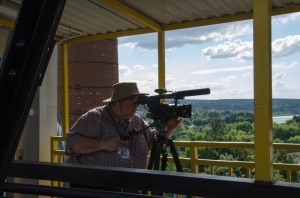 I very rarely stay in the same spot for more than a shot or 2. By moving around you are giving yourself more options to work with in the edit room and will help save you time. Shooting everything from one spot and scratching your head trying to figure out how your going to get around a jump cut is wasting valuable time. I love using a tripod for most of my shot, sometimes you just can’t but when I can, it makes my shots look and feel rock solid.
I very rarely stay in the same spot for more than a shot or 2. By moving around you are giving yourself more options to work with in the edit room and will help save you time. Shooting everything from one spot and scratching your head trying to figure out how your going to get around a jump cut is wasting valuable time. I love using a tripod for most of my shot, sometimes you just can’t but when I can, it makes my shots look and feel rock solid.
Talk to your reporter. A lot of times I will have my reporter go throw a wireless on someone for nothing more than a quick reaction or moment that I know can help keep the story pace going. In one case in Bosnia, my reporter was in the middle of a group of people singing, the nat sound we gathered would latter be used as background and really brought the story to life.
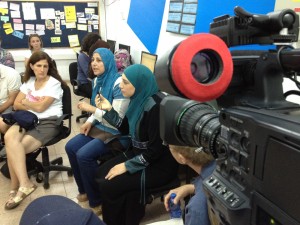 Get what you need and then move on to another element. DO NOT waste time getting throw away shots! You know your time is limited so make every shot count. Get the shots, sound, moments. that you know you could potentially use. Have your reporter thinking ahead and pointing out to you things that they could potentially use and things that they know they won’t so there is no time wasted. Let them know the elements you have gotten and any video, sound, moments. that you think should be in the story or be written to.
Get what you need and then move on to another element. DO NOT waste time getting throw away shots! You know your time is limited so make every shot count. Get the shots, sound, moments. that you know you could potentially use. Have your reporter thinking ahead and pointing out to you things that they could potentially use and things that they know they won’t so there is no time wasted. Let them know the elements you have gotten and any video, sound, moments. that you think should be in the story or be written to.
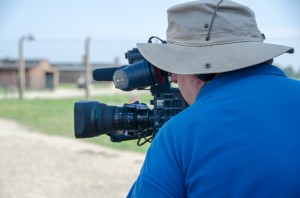 We normally do our logging of video (or as I sometimes refer to them “Tapes”) in the evening back at the hotel. While on location I always try to find a good opening soundbite or natural sound to use off the top. Creating a nice beginning to a story that draws your audience in can be time consuming so getting that out of the way before you ever get a script helps save precious time.
We normally do our logging of video (or as I sometimes refer to them “Tapes”) in the evening back at the hotel. While on location I always try to find a good opening soundbite or natural sound to use off the top. Creating a nice beginning to a story that draws your audience in can be time consuming so getting that out of the way before you ever get a script helps save precious time.
Something I do too is if I know I need to get to my money shots (the best of the best) really fast is I will just simply throw up some quick bars or wave my hand quickly in front of camera after a good nat, soundbite or moment I know I need to use.
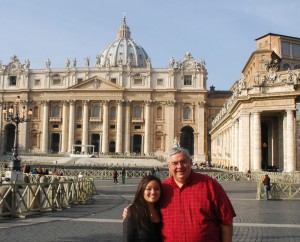 Working with these student journalists involves building a relationship from, I’m the photographer and your the reporter into, we are a “team” is the best way to tell powerful stories. Having that bond where you don’t have to say words to know what the other is thinking and so many times the reporter begins to develop those “inner intuitions”. Having the same goal of wanting to tell a great story and doing the things to help one another to save minutes and seconds.
Working with these student journalists involves building a relationship from, I’m the photographer and your the reporter into, we are a “team” is the best way to tell powerful stories. Having that bond where you don’t have to say words to know what the other is thinking and so many times the reporter begins to develop those “inner intuitions”. Having the same goal of wanting to tell a great story and doing the things to help one another to save minutes and seconds.
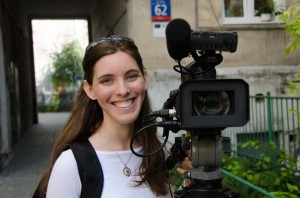 I am always thankful that I still have the opportunity to work with these young journalists and while they might learn from me, I also learn from them how to tell a story that is relevant to today’s audience. In countries where English is not the native language can provide a challenge but also teaches them how to handle themselves in different and sometimes difficult situations.
I am always thankful that I still have the opportunity to work with these young journalists and while they might learn from me, I also learn from them how to tell a story that is relevant to today’s audience. In countries where English is not the native language can provide a challenge but also teaches them how to handle themselves in different and sometimes difficult situations.
